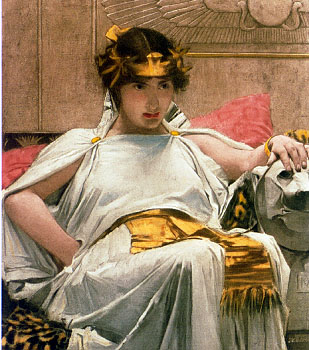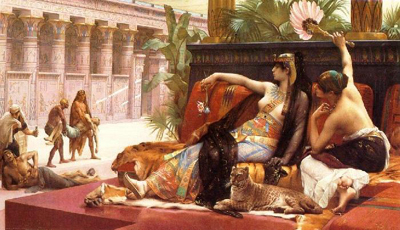 |
The Real Cleopatra Cleopatra VII was born in 69 B.C. in Alexandria, which was then the capital of Egypt. Her father was Egypt's pharaoh, Ptolemy XII. The family was not truly Egyptian, but Macedonian. They were descended from Ptolemy I, a general of Alexander the Great who became king of Egypt after Alexander's death in 323 B.C. When her father died in 51 B.C., Cleopatra and her brother Ptolemy XIII inherited the throne. |
|
Queen of Egypt Cleopatra was 17 or 18 when she became the queen of Egypt. She was far from beautiful, despite her glamorous image today. She is depicted on ancient coins with a long hooked nose and masculine features. Yet she was clearly a very seductive woman. She had an enchantingly musical voice and exuded charisma. She was also highly intelligent. She spoke nine languages (she was the first Ptolemy pharaoh who could actually speak Egyptian!) and proved to be a shrewd politician. In compliance with Egyptian tradition Cleopatra married her brother Ptolemy XIII, who was about 12 at the time. But it was a marriage of convenience only, and Ptolemy was pharaoh in name only. For three years he remained in the background while Cleopatra ruled alone. Ptolemy's advisors resented Cleopatra's independence and conspired against her. In 48 B.C. they stripped Cleopatra of her power and she was forced into exile in Syria. Cleopatra and Caesar Determined to regain her throne, Cleopatra amassed an army on Egypt's border. Meanwhile Julius Caesar marched into the city, seized control of the palace, and began issuing orders. Both Ptolemy and Cleopatra were to dismiss their armies and meet with Caesar, who would settle their dispute. But Cleopatra knew that if she entered Alexandria openly, Ptolemy's henchmen would kill her. So she had herself smuggled to Caesar inside an oriental rug. When the rug was unrolled, Cleopatra tumbled out. It is said that Caesar was bewitched by her charm, and became her lover that very night. When Ptolemy saw Caesar and Cleopatra together the next day, he was furious. Caesar had Ptolemy arrested, but the pharaoh's army - led by the eunuch Pothinus and Cleopatra's sister Arsinoe - laid seige to the palace. In hopes of appeasing the attackers Caesar released Ptolemy XIII, but the Alexandrian War continued for almost six months. Soon after their victory Cleopatra and Caesar enjoyed a leisurely two-month cruise on the Nile. The Roman historian Suetonius wrote that they would have sailed all the way to Ethiopia if Caesar's troops had agreed to follow him. Cleopatra may have become pregnant at this time. She later gave birth to a son, Ptolemy XV, called Caesarion or "Little Caesar." A year later Caesar invited Cleopatra to visit him in Rome. She arrived in the autumn of 46 B.C. Cleopatra lived in Caesar's villa near Rome for almost two years. Caesar showered her with gifts and titles. He even had a statue of her erected in the temple of Venus Genetrix. His fellow Romans were scandalized by his extra-marital affair. Due to the mounting scandal and resentment towards Caesar, on March 15, 44 B.C. a crowd of conspirators surrounded Caesar at a Senate meeting and stabbed him to death. Knowing that she too was in danger, Cleopatra quickly left Rome with her entourage. Before or immediately after their return to Egypt, Ptolemy XIV died, possibly poisoned at Cleopatra's command. Cleopatra and Mark Antony Caesar's assassination caused anarchy and civil war in Rome. Eventually the empire was divided among three men: Caesar's great-nephew Octavian, Marcus Lepidus; and Marcus Antonius, better known as Mark Antony. In 42 B.C. Mark Antony summoned Cleopatra to Tarsus (in modern-day Turkey) to question her about whether she had assisted his enemies.
The Greek writer Plutarch wrote of Cleopatra, "Plato admits four sorts of flattery, but she had a thousand. Were Antony serious or disposed to mirth, she had at any moment some new delight or charm to meet his wishes; at every turn she was upon him, and let him escape her neither by day nor by night. She played at dice with him, drank with him, hunted with him; and when he exercised in arms, she was there to see. At night she would go rambling with him to disturb and torment people at their doors and windows, dressed like a servant-woman, for Antony also went in servant's disguise . . . However, the Alexandrians in general liked it all well enough, and joined good-humouredly and kindly in his frolic and play." Finally, Antony said goodbye to Cleopatra and returned to his duties as a ruler of the Roman empire. Six months later Cleopatra gave birth to twins, Cleopatra Selene and Alexander Helios. In 37 B.C., while on his way to invade Parthia, Antony enjoyed another rendezvous with Cleopatra. From then on Alexandria was his home, and Cleopatra was his life. He married her in 36 B.C. and she gave birth to another son, Ptolemy Philadelphus. Cleopatra was determined to keep Antony away from his other wife. She cried and fainted and starved herself to prevent him from seeing her, and got her way.
They returned to Egypt, where Antony lived alone for a time, brooding, while Cleopatra prepared for an invasion by Rome. When Antony received word that his forces had surrendered at Actium and his allies had gone over to Octavian, he left his solitary home and returned to Cleopatra to party away their final days. Cleopatra began experimenting with poisons to learn which would cause the most painless death. She also built a mausoleum to which she moved all of her gold, silver, emeralds, pearls, ebony, ivory, and other treasure.
In 30 B.C. Octavian reached Alexandria. Mark Antony marched his army out of the city to meet the enemy. He stopped on high ground to watch what he expected would be a naval battle between his fleet and the Roman fleet. Instead he saw his fleet salute the Romans with their oars and join them. Antony returned to the city, shouting that Cleopatra had betrayed him. Terrified that he would harm her, Cleopatra fled to the monument that housed her treasures and locked herself in, ordering her servants to tell Antony she was dead. Believing it, Antony went to his room and opened his coat, exclaiming that he would soon be with Cleopatra. Antony stabbed himself in the stomach and passed out on a couch.
The Death of Cleopatra When Octavian and his men reached her monument Cleopatra refused to let them in. She negotiated with them through the barred door, demanding that her kingdom be given to her children. Octavian ordered one man to keep her talking while others set up ladders and climbed through the window. When Cleopatra saw the men she pulled out a dagger and tried to stab herself, but she was disarmed and taken prisoner. Cleopatra was determined to die. She ordered a feast, and while the meal was being prepared a man arrived at her monument with a basket of figs. The guards checked the basket and found nothing suspicious, so they allowed the man to deliver it to Cleopatra. After she had eaten, Cleopatra wrote a letter, sealed it, and sent it to Octavian. He opened it and found Cleopatra's plea that he would allow her to be buried in Antony's tomb. Alarmed, Octavian sent messengers to alert her guards that Cleopatra planned to commit suicide. But it was too late. They found the 39-year old queen dead on her golden bed, with her maid Iras dying at her feet. Her other maid, Charmion, was weakly adjusting Cleopatra's crown. "Was this well done of your lady, Charmion?" one of the guards demanded. "Extremely well," said Charmion, "as became the descendant of so many kings." And she too fell over dead. Two pricks were found on Cleopatra's arm, and it was believed that she had allowed herself to be bitten by an asp (a kind of poisonous snake) that was smuggled in with the figs. As she had wished, she was buried beside Antony.
 This account of Cleopatra's life was summarised from Cleopatra
|


